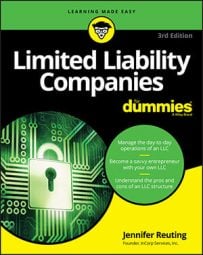Many LLCs restrict the transfer of ownership. Although this restriction used to be a requirement of LLCs, it is now more customary than anything else. Basically, if a member wants to sell or transfer her shares, she can only assign the economic rights to the ownership, not actually transfer it.
So the person purchasing the membership only has rights to the profits that are distributed; he has no voting rights and no control over the business’s operations. Sometimes this restriction is firm, and sometimes it can be overruled by a vote of the other members. Regardless, you and your partners decide it all in your LLC’s operating agreement.
Don’t fret too much over this limitation — it can be more of a positive than anything else! An assignee (the person or company purchasing the membership) can become a full member upon the approval of the majority of the other members. All it takes is a quick vote. But keep in mind that to fully transfer your membership shares, the other members must approve the transfer; otherwise, the assignee may end up as a silent partner with no voting rights or control.
Most states allow you to make your own rules regarding the transference of membership interest by stating them in your operating agreement. But keep in mind that just because you can allow for free transference of ownership (rather than the default limitations) doesn’t mean that you should. A lot of the power of charging order protection stems from the shares not being freely transferable.
If you intend to take your company public, bear in mind that you’ll probably get a lot of pressure to convert to a corporation, which could result in a hurricane-sized taxable event. You see, Wall Street doesn’t favor putting LLCs on the ticker — not when, by default, ownership in an LLC is not freely transferable and thousands (if not millions) of laws governing public companies have been written with corporations in mind.
This is why you need to know your exit strategy before choosing your entity type.

